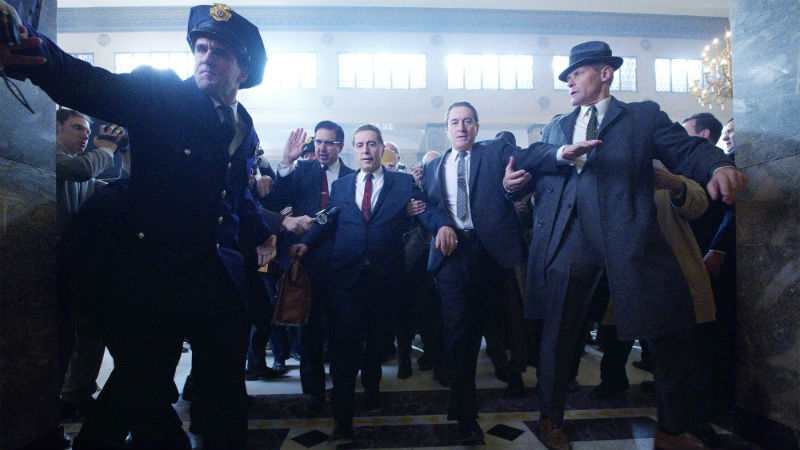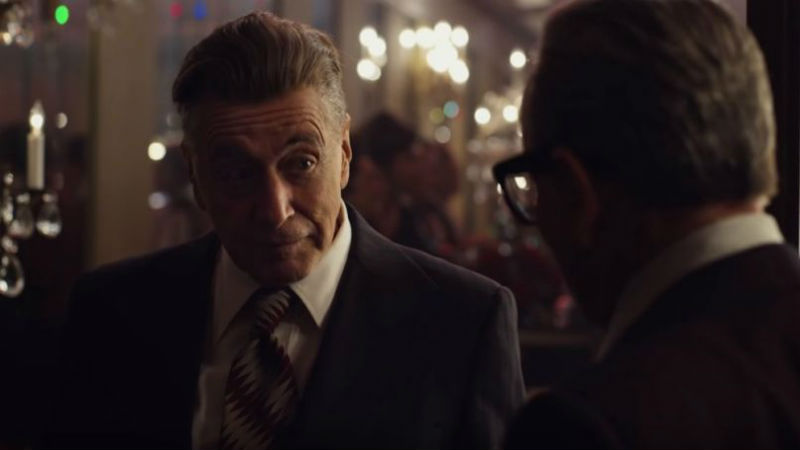




There’s a moment midway through Martin Scorsese’s The Irishman that seems hauntingly melancholic as it is inadvertently emotive the more you think about it. Frank Sheeran (Robert De Niro) has just acquainted the teamster president, Jimmy Hoffa (Al Pacino). They’ve only marginally confided with one another, speaking subtextually for what’s to become of their partnership. As Frank is getting ready to rest, Jimmy descends to his room, leaving the doors ajar as a thinning see through before turning the lights off.
This particular moment has a nuance spanning through the film’s 210-minute run time. It suggests more than what it simply emits, and not so much in character but in the philosophy which commentates the ethos of the inevitable means the men in this history prevail upon. The moment lingers with Frank placing his revolver on a night stand and quietly remaining still, guarding and inhabiting the confines of what’s to become his own solitude.
This is one of many moments in The Irishman, an engrossing epic of an unexpected power, that proposes a different kind of attitude towards a very familiar subject Scorsese is relatively known for. It is a rather bleak, at times dryly funny, and senescent biography of Frank Sheeran, a World War II veteran who became a hitman for the mafia, and then a union leader, and who had a simultaneously trusting friendship with Hoffa and Northeastern Pennsylvania mob boss, Russell Buffalino (Joe Pesci).
The film, adapted by Steve Zaillian from Charles Brandt’s book I Heard You Paint Houses opens in a retirement home, finding the back of an old Frank Sheeran, sitting on his wheelchair as the gliding long shot spirals to his front. He’s a boulder of an appearance, wearing shades over his leaden eyes and never once straining his mouth to evoke an expression. His entire demeanor is ghostly but living, and the moment he speaks, his statements become the narration of a history expanding through crime and politics, an intertwining of mafia history and American history. If Sheeran’s account on his own life were to be taken to credence (which, from the sources of many crime historians and investigators, it most definitely wouldn’t), then Frank would’ve been the Waldo in the rooms and events of pivotal moments in American history.
This would include the rise of Castro and the Bay of Pigs, John F. Kennedy’s assassination, the ‘blood feud’ between Bobby Kennedy and Jimmy Hoffa, and the mob wars spanning a decade. And somehow, all through the film, Frank seems as passive as he is old and immobile from when we first see him. It is from his narration that relays a denial of how everything went down, how his choices may have defined him and an uncertainty of what he must’ve felt. Capable of great violence, but neither pensive nor neurotic by the degree of his own violence, Frank is mostly a content figure lingering behind the talkative wise guys, the eccentrics more reckless and domineering for absolute rule. He is more reactive to abide, is muted by a nature that is never truly explained, and is perfectly capable of talking himself out of perilous confrontations. He’s introduced to the legacy of the Buffalino crime family by taking on petty theft jobs that involve running meat-truck scams and by simply being in the right place at the right time, meeting the right people. This begins with Felix “Skinny Razor” DiTullio (Bobby Cannavale), the teamster lawyer and cousin to Russell, Bill Buffalino (Ray Romano), and regarded Philadelphia crime boss Angelo Bruno (Harvey Keitel). Through these interactions, Frank describes his severe choices from their influences, and several murders made willingly as occurrences of complete arbitrary.

The unusual thing about The Irishman is how self-contained Scorsese is with helming a saga perhaps all too larger in pretext than Goodfellas (1990) and Casino (1995). There’s an admirably prolonging commitment to the film’s deadpan comedy, the deviation of its characters (in particular Pacino, and Katherine Narducci as Russell’s wife, Carrie), and it’s at times underwhelming response to the crux of every demise at the forefront. There’s rarely a saturation in the film’s design to introduce a variety of characters from an elder construct or the bombastic renaissance of figures such as Anthony Provenzano (Stephen Graham), and “Crazy” Joe Gallo (Sebastian Maniscalo). At the same time, from the constraints in which the film liberties the potential of never masking its heavily crestfallen semblance of its essence, the film faintly falters on that expense by keeping certain aspects unfulfilling.
Key players such as Anthony Salerno (Dominick Lombardozzi, unrecognizable in his aging prosthetics), DiTullio, Bill Buffalino (whose daughter’s wedding serves as a ploy for Frank and Russell to take a road tip that metaphorically denotes life, itself), Hoffa’s son Chuck (Jesse Plemmons), and Angelo Bruno all penetrate an emotional presence by introduction but their motives are fairly vague. As people, they’re almost difficult to define. It is evidently clear they’re involvement in the narrative is to essentially be rather than become a figure of influence that isn’t simply mannequinned by default.
Scorsese has never been one to feature a defining female presence in his crime-inducing films, unless one were to recount both Sharon Stone’s role in Casino and Lorraine Bracco’s all too knowing wife of Henry Hill’s in Goodfellas. They’re an element of the wise guy’s awakening, a somewhat entity of masquerading devotion, allured by embellishment curated by inherent sin. They are, for the most part and put bluntly in the world of Scorsese’s wise guys, their downfall. The women are manipulated from the expense of machismo lifestyle, they’re ignored and misunderstood. It is a dynamic in the romances from those films that are absent here for something potentially more refining in poignancy but is left as a minor study of fatherhood. That is from one of Frank’s daughters (the others are rarely characters) Peggy (Anna Paquin), who’s more of a muted astute ghost than Frank, himself. In the span of her lifetime involving Frank, she’s at first a witness to his brutality towards a grocery store runner who regrettably enforces physical disciplinary action towards her. His involvement with Russell and absentee as a father becomes more of a visceral frame of memory. It is cold, and thematically, the greatest loss in the war of politics and crime that Frank, by the end of the film, probably still doesn’t even realise.
There will be concerns regarding the de-aging technology used on De Niro, Pacino, Pesci, and Keitel. For the most part, it isn’t quite there yet, but as the film progresses that technical factor becomes less patent and goes to great effect (especially with the latter three, De Niro’s at first glance can’t go unnoticed). Another reason it almost seems so seamless through its entirety is on the basis of its performances that are apparent from the mild evolutions that transpire through the timeline.
You can see and feel the range of Robert De Niro and his years from this faded performance. His years as an actor are assembled (and not even instinctively) to the bare minimum of every trademark and energy he’s refined in ways only De Niro can deliver (and in specifics, his collaboration with Scorsese). This could be said the same for Al Pacino, Joe Pesci, and Harvey Keitel (who spends most of the time in the film sitting behind a table, with faint sway). It is unusual to see Pacino in a Scorsese film, in the same way it was for Jack Nicholson purveying his anomalous energy in The Departed (Scorsese, 2006). You question why they haven’t worked together before. And Pacino shares a great amount of screentime with De Niro that become less of a spectacle, than let’s say, their one scene in Heat (1995, Scorsese), and their overly prompted back and forths in Righteous Kill (John Avnet, 2008), and more interactive by an unexpected depth of compassion. Pacino in particular, shares a few scenes with De Niro and one incredible scene with Pesci that are so masterfully performed, and so simplistically constructed by Scorsese that it echoes the Herculean spirit of The Godfather.

Which makes this viewing of The Irishman almost more personal than analytical in the sense that this was premiered at the 57th Annual New York Film Festival, with a 35mm IB technicolor print screening of The Godfather Part II (1974) just a few days after. That film serves as a case study for Michael Corleone’s obsession for protecting the family name by blood, business, and a legacy sprawling from one too many prides tampered by conceited desires (given Sonny’s recklessness for violence, and Fredo’s weakness for respect and riches, and Tom’s loyalty over a name that isn’t even his), and his own family (Kay, and his children).
Michael is at the forefront of all the other eccentrics who deem power, but is for the most part ghostly in his rule, and desensitised to the convictions of those around him that he, by the nature of his own impassiveness to what’s of importance, loses just about everything he’s built (as in the case of The Irishman, Frank Sheeran). The parallel of this to young Vito Corleone (played by De Niro) establishing a new wave of crime from a more respectful and family driven angle, is perhaps the underlying and all too certain decree of what destroys the Corleone’s in its saga of betrayal, politics, the mafia, and essentially the pride of its maleness vitality.
For Frank Sheeran to pose a paralleling figure of Michael Corleone seems almost too determined and instinctual, but then you’d have to consider Pacino and Pesci’s take on the egos surrounding Frank. How unavoidable many contrivances could’ve been if meshing politics with crime would be of no reality. For every action and incentive, originated by a pureness for altering a time utilising on the vices that seem everlastingly timeless, paradoxically foil to the sin of what inspires no other measure other than the final and fatalistic destination.
And as one film illustrates this from a more operatic, and family oriented view in sin. Martin Scorsese’s The Irishman revisits this from an angle he’s approached in almost every film in his filmography, but is perhaps the most personal in delving from the vintage Scorsese that has transitioned to an elder Scorsese, one who’s lens is clearer from intense imagery to a sombre casualty of the many characters of his whom are left in the isolation of their attempts to unravel in nothingness. What was their aim at the end of all things? What do we make of Frank Sheeran, old, confused, scarred by a history that repeats itself with fresher spectators, sitting to a door left ajar?
It is unclear (and by design, perhaps) whether Martin Scorsese is using this narrative to unveil what could be his struggling, or at this point, accepted conviction of religion and sin. The 76-year-old American director can easily retire after this feat, which will live on with the powerful aspect of never being confessional to that idea, or many more viewers will choose to analyse when noting the hauntingly impassive nature of it’s lead.
The Irishman premiered at the New York Film Festival, when this piece was originally written. It’s out in cinemas on Friday, November 8th. On Netflix in January.





















